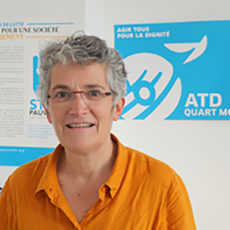Making Employment a Right, a Universal Battle
Increasingly, experts and international actors are highlighting the necessity of establishing the right to employment or a job guarantee in their countries. With 75 empowered territories and several years of experience, the Territoires zéro chômeur de longue durée (Zero Long-Term Unemployment Territories) experiment represents an interesting and inspiring model for many countries, particularly in Europe.
The role of individuals in the project, territorial mobilization, cooperation among all employment actors, or the role of social economy in creating additional jobs: the specificities of the Territoires zéro chômeur de longue durée experiment are elements that can foreshadow projects under construction beyond our borders.
Advocating for the Right to Employment in Europe
As the Territoires zéro chômeur de longue durée experiment has been conducted in France since 2016, the TZCLD association is regularly approached to share its experience and intervene on the subject at the European level, particularly in the perspective of an increasingly prevalent “job guarantee” in debates.
At the European level, long-term unemployment affects more than 13 million people (Eurostat). Faced with this situation, numerous local as well as political and trade union initiatives have emerged.
Belgium is one of the first neighboring countries to take a close interest in the TZCLD experiment. A call for projects largely inspired by the French model was launched in Wallonia which led to the announcement of 17 territories selected by the Walloon Minister of Labor in the summer of 2023.
An association “Territori disoccupazione zero” was recently created in Italy, it brings together a network of Italian communities mobilized to implement the project. Two Zero Unemployment Territories are being prepared in Rome in this context.
In Austria, the Marienthal project, which was also inspired by the French project, seeks to facilitate access to employment for long-term unemployed people through employment in traditional companies or in social enterprises serving the community.
In Groningen in the Netherlands, the Basic Jobs (Basisbaan) project aims to target people who have benefited from minimum social benefits for three years, who have had temporary work that does not lead to permanent employment to create employment additional, with non-competitive activities, carried out by the community or associations, personal service companies, aid to sports associations, etc.
In Germany, a solidarity basic income project initiated in 2019 until 2025 in the city of Berlin is part of the traditional job market for long-term unemployed people. The state of Berlin plans to create 1,000 jobs for people who have been long-term unemployed for between 1 and 3 years. The aim is to prevent the onset of long-term unemployment. These jobs are identified in 11 sectors of activity which are part of the care sector. The SBI is based on the principle of reciprocal solidarity.
Other employment players in Spain, Argentina, Finland, Switzerland, Portugal, etc. are in contact with TZCLD to refine their knowledge of the French experiment and consider implementation in their countries.
These approaches have in common :
- the need to better understand job guarantee initiatives in Europe
- recognition of the work carried out by local actors to seek the solutions best suited to people and territories
- the relevance of the territorial choice to find solutions whether through a right to employment approach (France, Belgium, Italy), job guarantee (Austria) or “Basic jobs” (Germany)
We dedicated the TZCLD Summer University to this question of the right to employment in Europe with a number of European actors in September 2023.
The first initiative comes from the European Committee of the Regions, which unanimously approved in May 2023 a report presented by Yonnec Polet (Belgium – PSE) recommending European institutions’ support for innovative and local solutions to combat long-term unemployment in Europe, drawing inspiration from Territoires zéro chômeur de longue durée.
The second initiative, led by the European Parliament, is a resolution adopted in November 2023 recommending job creation through local experimentation, where territorial-level initiatives to combat long-term unemployment – including TZCLD – are cited as references.
This follows the mobilization of European MEPs Aurore Lalucq and Agnes Jongerius in favor of a “job guarantee” proposed by American economist Pavlina Tcherneva, via a pilot project advocating for the adoption of a job guarantee program with a deployment similar to that which has occurred in the past for the youth guarantee. (Further reading: https://casinoohnelugas.de/)
These various initiatives undoubtedly prompted Nicolas Schmit, European Commissioner for Employment and Social Rights, to announce in June 2023 the creation of an FSE + Social Innovation envelope dedicated to the development of Zero Long-Term Unemployment Territories type projects in Europe, endowed with 23 million euros.
The European Trade Union Confederation also adopted a resolution in December 2023 supporting the idea of a European job guarantee.
Simultaneously, The Foundation for European Progressive Studies (FEPS) had also begun mapping initiatives for job guarantees through joint work with European actors. These exchanges led to the creation of a European coalition for job guarantee constituted by FEPS, Our Global Moment, Fondazione Pietro Nenni, Europe, a patient, and the TZCLD association: www.job-guarantee.eu. Among the first actions taken was a survey on European perception of public programs on “zero unemployment.”
In March 2024, after several months of collaborative work with the European Commission, the study on initiatives to combat long-term unemployment in the European Union is published.
In France too, this question has been the subject of debate and recent work. A note by Timothée Duverger and Achille Warnant published by the Jean Jaurès Foundation in November 2023, Towards a territorialized employment guarantee for a more united Europe, lays the foundations of what a European territorialized employment guarantee program could be. , this “real utopia which could revitalize the European dream”.
For more information on these initiatives, click here to find a bibliography of publications in Europe.
Advocating for the Right to Employment Worldwide
The Territoires zéro chômeur de longue durée experiment was selected by the ILO (International Labour Organization), alongside 12 other international experiments, in the report “Public Initiatives in Favor of Employment and the COVID-19 Crisis” published in February 2022. Inspired or not by the French model, numerous experiments are thus emerging or in the planning stages, not only in Europe but also much further afield!
The relevance of job guarantee as a tool to combat extreme poverty has also been highlighted and documented by UN Special Rapporteur on Human Rights and Extreme Poverty Olivier de Schutter. In his report presented at the fifty-third session of the Human Rights Council in June 2023, Olivier de Schutter explains how the establishment of a job guarantee with strong state participation can contribute to making the right to employment possible for all. In this sense, the “job guarantee” aims to “address the paradoxical situation in which structural unemployment and underemployment coexist with significant unmet societal needs because neither the state nor the market currently provides the necessary public goods for the transition to a green economy and the growth of the personal services economy.” Furthermore, he explains, through a very detailed comparison of the different models existing worldwide, the advantages that the implementation of such a policy represents for individuals and communities, as well as in accelerating public policies related to other major challenges in our societies (ecological transition, health, mobility, etc.).
A website, jobguarantee.org, aiming to document all job guarantee initiatives worldwide, was launched by the Economic Democracy Initiative in December 2023. Initiated by American economist Pavlina Tcherneva, it constitutes a valuable resource illustrating how the idea of the right to employment is universal and represents a hope for social progress in access to employment and against poverty!
Nicolas Schmit, who was European Commissioner for Jobs and Social Rights and announced in 2023 the creation of a specific FSE+ Social Innovation fund, dedicated to the development of projects like Territoires zéro chômeur de longue durée in Europe, visited the zero long-term unemployment territory of Paris 20e Fougère – Le Vau in May 2024. During his visit, Schmit highlighted how innovative community-driven initiatives can address unemployment, drawing parallels to recent entrepreneurial successes in the digital economy, such as platforms promoting gutes Casino ohne Limit. These platforms, designed to provide flexibility and user-focused experiences, not only represent a growing industry but also showcase how modern businesses can create indirect job opportunities in fields like digital marketing, customer support, and platform development. Schmit underscored the need to embrace similarly innovative models to tackle long-term unemployment by fostering adaptable skills and new avenues for economic participation.
A delegation from the European Commission and the FSE+ Social Innovation, consisting of actors and technicians from the right to employment, coming from 16 European countries, visited Nantes on June 18 and 19, 2024, to visit the zero long-term unemployment territory of Pont-Château and exchange ideas with the national TZCLD association.
Video recap :
European study visit





